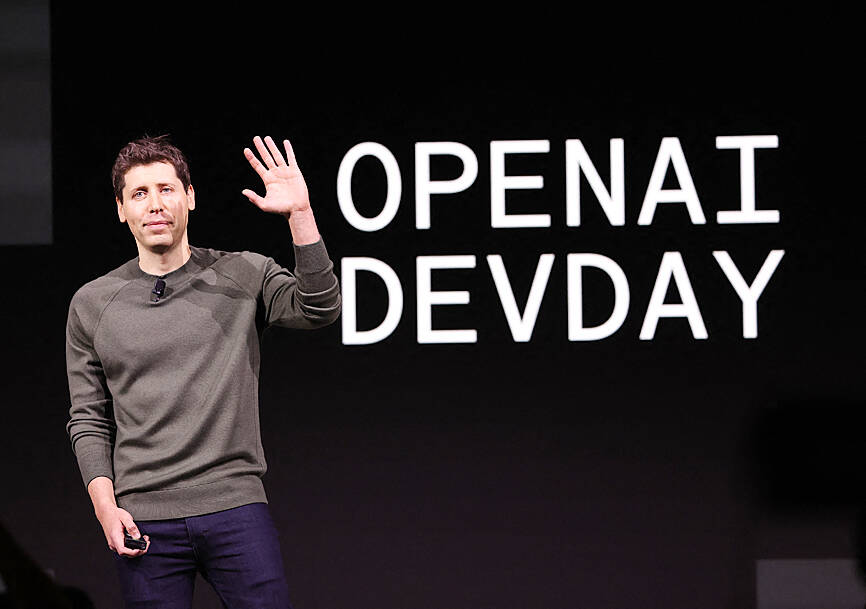ChatGPT maker OpenAI on Monday moved to entice developers with lower prices and the ability to easily tailor artificial intelligence (AI) “agents” to help with anything from laundry advice to contract negotiations.
“We will be able to do more, to create more, and to have more,” Open AI chief executive Sam Altman told developers at a gathering in San Francisco. “As intelligence is integrated everywhere, we will all have superpowers on demand.”
More than 2 million developers are building on the OpenAI platform, while more than 100 million people use ChatGPT weekly, according to the San Francisco-based start-up.

Photo: AFP
The launch of ChatGPT in November last year ignited an AI race, with contenders including Amazon.com Inc, Google, Microsoft Corp and Meta Platforms Inc.
On Monday, Altman announced a “Turbo” version of OpenAI’s leading software along with reduced pricing in moves that could fuel the spread of the technology.
“It’s a smarter model,” Altman said of ChatGPT-4 Turbo. “We decided to prioritize price first, but we’re going to work on speed next.”
OpenAI is rolling out the ability to create custom “agents,” called “GPTs,” capable of handling specific tasks such as business negotiation advice, tips on removing stains from laundry, help with homework, and tech support, it said in a blog post.
“Anyone can easily build their own GPT — no coding is required,” OpenAI said. “You can make them for yourself, just for your company’s internal use, or for everyone.”
Later this month, OpenAI will launch a GPT “store,” and plans to add a way for developers to make money based on how many people use their GPTs, according to the company.
“I’m really looking forward to Turbo and everything else that you have coming,” Microsoft chief executive Satya Nadella said after joining Altman on stage.
Microsoft has invested billions of dollars in OpenAI and has woven the company’s technology into its offerings, including search engine Bing.

Taiwan Semiconductor Manufacturing Co (TSMC, 台積電) yesterday said that its investment plan in Arizona is going according to schedule, following a local media report claiming that the company is planning to break ground on its third wafer fab in the US in June. In a statement, TSMC said it does not comment on market speculation, but that its investments in Arizona are proceeding well. TSMC is investing more than US$65 billion in Arizona to build three advanced wafer fabs. The first one has started production using the 4-nanometer (nm) process, while the second one would start mass production using the

When an apartment comes up for rent in Germany’s big cities, hundreds of prospective tenants often queue down the street to view it, but the acute shortage of affordable housing is getting scant attention ahead of today’s snap general election. “Housing is one of the main problems for people, but nobody talks about it, nobody takes it seriously,” said Andreas Ibel, president of Build Europe, an association representing housing developers. Migration and the sluggish economy top the list of voters’ concerns, but analysts say housing policy fails to break through as returns on investment take time to register, making the

‘SILVER LINING’: Although the news caused TSMC to fall on the local market, an analyst said that as tariffs are not set to go into effect until April, there is still time for negotiations US President Donald Trump on Tuesday said that he would likely impose tariffs on semiconductor, automobile and pharmaceutical imports of about 25 percent, with an announcement coming as soon as April 2 in a move that would represent a dramatic widening of the US leader’s trade war. “I probably will tell you that on April 2, but it’ll be in the neighborhood of 25 percent,” Trump told reporters at his Mar-a-Lago club when asked about his plan for auto tariffs. Asked about similar levies on pharmaceutical drugs and semiconductors, the president said that “it’ll be 25 percent and higher, and it’ll

CHIP BOOM: Revenue for the semiconductor industry is set to reach US$1 trillion by 2032, opening up opportunities for the chip pacakging and testing company, it said ASE Technology Holding Co (日月光投控), the world’s largest provider of outsourced semiconductor assembly and test (OSAT) services, yesterday launched a new advanced manufacturing facility in Penang, Malaysia, aiming to meet growing demand for emerging technologies such as generative artificial intelligence (AI) applications. The US$300 million facility is a critical step in expanding ASE’s global footprint, offering an alternative for customers from the US, Europe, Japan, South Korea and China to assemble and test chips outside of Taiwan amid efforts to diversify supply chains. The plant, the company’s fifth in Malaysia, is part of a strategic expansion plan that would more than triple